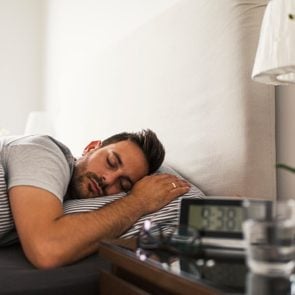How to Wake Yourself Up in a Natural and Easy Way
Updated: Mar. 14, 2022
Rise and shine sounds good, but it isn't always easy to drag yourself out of bed—much less be happy about it. Here are expert-recommended tips for waking yourself up in the morning, from sticking to a sleep schedule to avoiding jumping directly into the shower.
When waking up is hard to do
The early bird gets the worm, and if you snooze, you lose. Even with these sayings etched in mind, it can be challenging to wake up in the morning.
If you’re ready to seize the early hours of the day, or at the very least, learn how to wake yourself up in the morning without feeling depleted and cranky, here’s what you need to know.
Start with good sleep
Don’t neglect the basics—getting a good night’s sleep is essential to waking yourself up in the morning. Sufficient sleep is one of the three pillars of a healthy lifestyle, along with good nutrition and regular exercise, according to Raman Malhotra, MD, member of the board of directors of the American Academy of Sleep Medicine (AASM), sleep physician, and associate professor of neurology at Washington University Sleep Center in St. Louis, Missouri.
The way to get adequate sleep is through the two Qs: quantity and quality, says Raj Dasgupta, MD, an assistant professor of clinical medicine at the Keck School of Medicine, University of Southern California, Los Angeles.
How much sleep do you need?
Sleep deprivation is an obvious reason you might have trouble waking up in the morning. If you’re consistently skimping on shut-eye, no magic trick will help make your wake-up easier.
“One of the most common reasons why people have a difficult time starting their day, deal with excessive daytime sleepiness, or deal with fatigue, is because they don’t have the appropriate quantity of sleep,” Dr. Dasgupta says.
So make sure you’re getting the right amount of sleep that you need. Most adult Americans are used to getting six and a half hours of sleep, but require around seven to nine hours, according to Qanta Ahmed, MD, a sleep disorder specialist with NYU Winthrop Hospital and associate professor at NYU Long Island School of Medicine.
How to get good-quality sleep
The second Q, quality, is equally important. To get a good night’s sleep, make sure you have good sleep hygiene. Limit tech and screens 30 minutes before bedtime, sleep with minimal bedding, keep your space clean and room dark, and set your thermostat to the best sleep temperature: 65 degrees Farenheight.
Dr. Malhotra also recommends making your bedroom as quiet and relaxing as possible, only going to bed if you’re sleepy, and avoiding large meals before hitting the sack, too.
If you get good-quality sleep, you’ll be able to go to the deeper stages of non-REM and REM sleep that refresh you, according to Dr. Dasgupta. It’s so important to keep these sleep hygiene tips in mind because they can help you avoid multiple awakenings and arousals that may keep you from getting enough time sleeping during those important stages.
What happens when we wake up?
Brainwaves change from tall, slower rhythms of sleep to flatter, faster, consistent waves as our brain and body wake up. From the moment we wake, heart and breathing rates increase, Dr. Malhotra says. Blood pressure also rises from the moment we step out of bed in the morning. Our body temperature, which is typically lower during sleep, rises in the morning when we wake up.
Levels of cortisol, often referred to as the stress hormone, decrease during the first few hours of sleep and peak after we wake up, which increases the feeling of alertness in the waking hours. “Cortisol also helps increase our appetite,” Dr. Malhotra says. “Eating a healthy breakfast is an essential fuel to help your body and mind perform at their best for the rest of the day.”
Why can’t I wake up in the morning?
If you’re having a hard time waking up in the morning, there are quite a few things to possibly blame. Common sleep disrupters, including alcohol, caffeine, and tobacco, can all inhibit sleep quality and make waking up in the morning more difficult, per Dr. Malhotra.
Other things that cause difficulty waking up in the morning are sleep disorders or underlying conditions, such as depression. Sleep disorders, including sleep apnea and insomnia, may affect the quality of your sleep and make it tough to wake up in the morning, Dr. Malhotra says.
Sleep affects every single part of the body, according to Dr. Dasgupta, so many conditions affect sleep, and sleep affects many conditions. Certain medications, such as SSRIs—the class of antidepressants that includes drugs like fluoxetine (Prozac) and sertraline (Zoloft)—and muscle relaxants, can also make it hard to wake up in the morning.
If none of the above applies, and you’re doing everything experts recommend, and it’s still tough to rise and shine, Dr. Malhotra says you might be fighting your circadian clock, which is your natural internal rhythm.
“Trying to wake up in the morning at a time that is not in sync with your internal clock can also make it difficult to wake up,” Dr. Malhotra says. “Your brain and body like consistent bedtimes and wake times, so trying to wake up even one or two hours earlier than your usual wake time can be difficult.”

How to wake yourself up
The key to waking yourself up in the morning is focusing on the things you can control, especially the day before. In fact, Dr. Ahmed says that the vast majority of problems that Americans have with waking up isn’t an undiagnosed sleep disorder, but habits around sleep hygiene, sleep environments, and a lack of a sleep routine.
Here’s what you can do, according to the experts:
Stick to a sleep schedule
The most important tip Dr. Malhotra, Dr. Dasgupta, and Dr. Ahmed all recommend is to stick to a sleep and wake schedule. Yes, that includes your weekends, too.
“Don’t treat yourself by staying up late and watching Netflix or Disney+ on Friday night,” Dr. Dasgupta says. “Your treat should be that you still have a set bedtime, but on Saturday morning, wake up early and go outside with a mask and get some exercise.”
Healthy sleepers wake up and go to bed at the same time seven days a week, Dr. Ahmed says. According to Dr. Malhotra, doing so helps you fall into a regular routine and helps you wake naturally feeling well-rested.
Stick to a meal schedule
The timing of food very closely influences the timing of sleep, and the timing of sleep influences the timing of your appetite, Dr. Ahmed says. Two hunger-regulating hormones, ghrelin, and leptin, are affected by sleep. That’s why she sometimes recommends intermittent fasting to her patients, especially those struggling with their weight.
In general, it’s ideal to finish eating three hours before sleep.
As part of your morning routine, Dr. Ahmed says to keep in mind that food and social interaction are both stimulating. So try planning breakfast to have breakfast with company, if possible. Keep your coffee or tea as part of your morning routine, too, as it blocks neurotransmitters in the brain that would normally promote sleep.
Use light to your advantage
Daylight and natural light activate sensors in the brain that act as our internal alarm clock, according to Dr. Ahmed. Bright, morning light, when received by our brain at around the same time every day, is a powerful signal telling us to wake up. Getting that sunlight also suppresses melatonin and resets your circadian rhythm, Dr. Dasgupta notes.
Plus, light has the added benefit of promoting alertness, which is particularly important if you find it difficult to get going in the morning. (Here are the 10 best light therapy lamps on Amazon.)
The human biological clock is actually 24.3 hours a day, according to Dr. Ahmed. That means, if left to our devices, people would eventually wake up later and later and go to bed later and later. Light is the most powerful stimulus signaling when to wake, and helping us stay o that 24-hour clock.
“As soon as you wake, get out of bed and open the curtains or blinds to let in sunlight,” Dr. Malhotra says. If you don’t have access to natural light, turn on bright indoor lights.
Get moving
As part of your morning routine, try and squeeze in a walk outside to get the blood flowing and increase alertness, Dr. Malhotra recommends. Exercise also raises the body’s core temperature—and you can’t fall asleep when core body temperature is high.
Although the best time to exercise is a personal choice, aim to complete any exercise within five hours of bedtime, so your body has time to cool back down and prepare for sleep, Dr. Ahmed recommends. And please, don’t sacrifice total sleep time for exercise, Dr. Ahmed warns. It’s self-defeating if you skimp on sleep to get in a workout as you also set yourself up to gain weight.
Skip the snooze
Please, don’t hit that snooze button in the morning. Although it’s tempting, Dr. Dasgupta says it could do more harm than good. It’s ideal to try and avoid waking up during lighter stages of sleep. If you hit the snooze and go back to sleep, there’s no telling what stage you’ll be in when you wake up, Dr. Dasgupta explains.
“That’s when you’ll feel sleep inertia,” he says. AKA the terminology for when you wake up feeling sluggish and have a hard time starting your day. If you are constantly hitting snooze and staying in bed, it’s time to go back to the two Qs.
Avoid jumping directly into the shower
Although the shower does wake you up, Dr. Ahmed advises her patients not to do so immediately after waking up in the morning. You’re not fully alert and coordinated the first second of waking up, so take time to make your coffee and open the curtains.
“We don’t go on and off like an Apple computer,” she says. “There’s a difference between being awake and being alert.”















